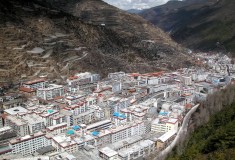-
Unpacking Covid-19 and the Connections Between Ecosystems, Human Health, and Security
› “What are the underlying drivers of risk that created the conditions for Covid-19 to emerge, and how do we better address them?” said Lauren Herzer Risi, Project Director for the Environmental Change and Security Program, in this week’s Friday Podcast, recorded during a recent Wilson Center Ground Truth Briefing on the Covid-19 pandemic. This question framed the discussion, which explored the intersection of the environment, public health, and national security. Although the global pandemic came as a shock to many, the novel coronavirus was not a surprise to epidemiologists and experts who had been sounding the alarm for decades. There have been clear signals of the risks we face from animal-to-human virus transmission, including Ebola, SARS, and other regional epidemics, said Risi. These zoonotic diseases, especially now, are creating concerns about food safety, wildlife conservation, and public health. But the risks don’t just come from wet markets and our increasingly connected world.
“What are the underlying drivers of risk that created the conditions for Covid-19 to emerge, and how do we better address them?” said Lauren Herzer Risi, Project Director for the Environmental Change and Security Program, in this week’s Friday Podcast, recorded during a recent Wilson Center Ground Truth Briefing on the Covid-19 pandemic. This question framed the discussion, which explored the intersection of the environment, public health, and national security. Although the global pandemic came as a shock to many, the novel coronavirus was not a surprise to epidemiologists and experts who had been sounding the alarm for decades. There have been clear signals of the risks we face from animal-to-human virus transmission, including Ebola, SARS, and other regional epidemics, said Risi. These zoonotic diseases, especially now, are creating concerns about food safety, wildlife conservation, and public health. But the risks don’t just come from wet markets and our increasingly connected world. -
Can Singapore’s NEWater Spark a Wastewater Revolution in China?
›
China is one of the “thirstiest” countries in the world with a per capita water availability a quarter of the United States. With population, pollution, and water shortages growing unabatedly, reclaimed water (e.g., treating wastewater to drinking water standards) could be the answer to China’s water insecurity. In China, extensive research in the 1980s into water reclamation and urban investments supporting infrastructure in the 2000s sparked production capacity in the country to rise from 63 billion gallons a day to 236 billion gallons per day between 2009 to 2015. Today, however, reclaimed water is a mere drop in the bucket meeting less than 1 percent of total urban water use. China could look to the tiny Southeast Asian city-state of Singapore to learn how it tapped reclaimed water to turn its water-scarce tiny island into a high-tech hydrohub.
-
Enhancing Water Security and the Role of Diplomacy in Africa’s Mara River Basin and Beyond
›
The Mara River traverses nearly 14,000 kilometers in Kenya and Tanzania, flowing through the Masai Mara National Reserve in Kenya and the Serengeti National Park in Tanzania. It is a vital water source for more than 1 million people in the area, as well as for 2 million zebras and wildebeests. In fact, the Mara River Basin is “one of the most ecologically important basins in the world,” according to Basil Mahayni, Deputy Director of USAID’s Sustainable Water Partnership’s (SWP). Communities in Kenya and Tanzania depend on the Mara River Basin for a variety of needs, including drinking water, livelihoods, and ecosystem preservation. Therefore, water security in this basin is essential to ecological health of the basin and its wildlife and the region’s economic development.
-
Delivering a Solution to the World’s Ocean Plastic Problem
›
In 2017, the Green Volunteer League of Chongqing, an environmental NGO, filed a suit against China’s three biggest food delivery companies—Meituan, Baidu, and Ele.me—for damaging the environment by generating excessive waste. Specifically, these three e-commerce platforms provided consumers with single-use chopsticks that consumed 6,700 trees every day as well as massive amounts of plastic containers, bags, and utensils. Today, over 400 million Chinese are regular users of food delivery. Since summer 2019, daily app use for Meituan was over 30 million orders, generating 100 million plastic containers every day—enough to carpet 360 football fields.
-
To Fight for a Living Planet, Restore its Biology
› We face the greatest environmental challenges ever relating to climate change, biodiversity, land use, and more. Humans are driving 1 million species to extinction, according to a report by the UN-backed Intergovernmental Science-Policy Platform on Biodiversity and Ecosystem Services. Some $44 trillion of annual global economic product that depend on nature are in jeopardy. Fires have ravaged large swathes of the Amazon—Brazil and Bolivia in particular—and Australia.
We face the greatest environmental challenges ever relating to climate change, biodiversity, land use, and more. Humans are driving 1 million species to extinction, according to a report by the UN-backed Intergovernmental Science-Policy Platform on Biodiversity and Ecosystem Services. Some $44 trillion of annual global economic product that depend on nature are in jeopardy. Fires have ravaged large swathes of the Amazon—Brazil and Bolivia in particular—and Australia. -
Pig Disease is Creating a Mountainous Solid Waste Problem
›
On a rainy July afternoon in 2017, I was in Jinhua, China, a city just south of Shanghai, to visit a pig farm. This was not just any pig farm—the Mebolo farm grows pigs that become the prized Jinhua Hams, a Chinese delicacy for nearly 1500 years. Long before Italians produced prosciutto and the Spanish their Jamón serrano ham, Marco Polo discovered Jinhua ham in the 13th century and brought ham-making techniques back to Europe.
-
Advancing One Health: Protecting People, Gorillas, and the Land on Which They Live
› In 2003, a scabies skin disease outbreak affecting mountain gorillas in Bwindi Impenetrable National Park was traced to people living around the national park—people with limited access to basic health and social services. To protect the people and wildlife of this special park, we launched Conservation Through Public Health (CTPH), an NGO that promotes biodiversity conservation by enabling people, gorillas, and other wildlife to coexist harmoniously through improved health and wellbeing.
In 2003, a scabies skin disease outbreak affecting mountain gorillas in Bwindi Impenetrable National Park was traced to people living around the national park—people with limited access to basic health and social services. To protect the people and wildlife of this special park, we launched Conservation Through Public Health (CTPH), an NGO that promotes biodiversity conservation by enabling people, gorillas, and other wildlife to coexist harmoniously through improved health and wellbeing. -
Black Coal to White Trash
›
Coal has long been China’s “black gold,” supplying over half of the nation’s electricity. Yet as coal’s energy share decreases due to domestic action to reduce air pollution and greenhouse gas emissions, a new coal industry is emerging. In China’s arid northwest, eight plants are pulverizing coal chunks and “cooking” coal powder into something more valuable than power—or maybe even gold. These coal conversion plants, soon numbering over 20, churn out chemicals to produce plastic.
Showing posts from category environmental health.


 “What are the underlying drivers of risk that created the conditions for Covid-19 to emerge, and how do we better address them?” said Lauren Herzer Risi, Project Director for the Environmental Change and Security Program, in this week’s Friday Podcast, recorded during a recent Wilson Center
“What are the underlying drivers of risk that created the conditions for Covid-19 to emerge, and how do we better address them?” said Lauren Herzer Risi, Project Director for the Environmental Change and Security Program, in this week’s Friday Podcast, recorded during a recent Wilson Center 

 We face the greatest environmental challenges ever relating to climate change, biodiversity, land use, and more. Humans are driving 1 million species to extinction, according to a
We face the greatest environmental challenges ever relating to climate change, biodiversity, land use, and more. Humans are driving 1 million species to extinction, according to a 
 In 2003, a scabies skin disease outbreak affecting mountain gorillas in Bwindi Impenetrable National Park was traced to people living around the national park—people with limited access to basic health and social services. To protect the people and wildlife of this special park, we launched
In 2003, a scabies skin disease outbreak affecting mountain gorillas in Bwindi Impenetrable National Park was traced to people living around the national park—people with limited access to basic health and social services. To protect the people and wildlife of this special park, we launched 


